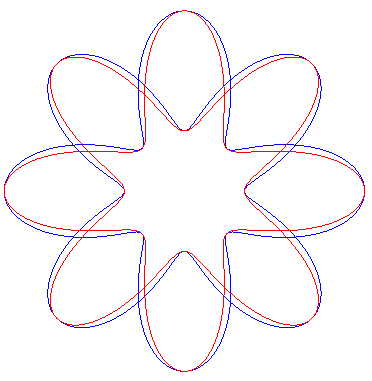Algebraic curve iff n is rational: if p and q are the numerator and denominator of n, the degree is 2(p +q) if p and q are odd, and 4(p + q) otherwise.
For n =1, it is the circle with centre (b, 0) and radius a.
For a = b (e = 1), it is the rose
| next curve | previous curve | 2D curves | 3D curves | surfaces | fractals | polyhedra |
FOLIOID
| Curve studied by P. van Geer in 1918.
Loria 3D p. 240 |
| Polar equation: Algebraic curve iff n is rational: if p and q are the numerator and denominator of n, the degree is 2(p +q) if p and q are odd, and 4(p + q) otherwise. For n =1, it is the circle with centre (b, 0) and radius a. For a = b (e = 1), it is the rose |
Case e < 1: the curve is rather close to a double conchoid of a rose: ):
 In blue, the two conchoids of a rose, and in red the folioid, here with n = 4.
In blue, the two conchoids of a rose, and in red the folioid, here with n = 4.
Case e > 1: the curve is composed of p closed curves if p and q are odd, and 2p curves otherwise.

n = 1: circle |

n = 2 |

n = 3 |

n = 4 |

n = 5 |

n = 1/2 |

n = 3/2 |

n = 5/2 |

n = 7/2 |

n = 9/2 |

n = 1/3 |

n = 2/3 |

n = 4/3 |

n = 5/3 |

n = 7/3 |

n = 1/4 |

n = 3/4 |

n = 5/4 |

n = 7/4 |

n = 9/4 |

n = 1/5 |

n = 2/5 |

n = 3/5 |

n = 4/5 |

n = 6/5 |
If it is wrapped around the plane of the circle into a cone with vertex O and half-angle
, with axis Oz, the projection on xOy of this wrapped around circle is the folioid
. This provides a construction of folioids based on a simple circle in the case n < 1.
| next curve | previous curve | 2D curves | 3D curves | surfaces | fractals | polyhedra |
© Robert FERRÉOL
2017